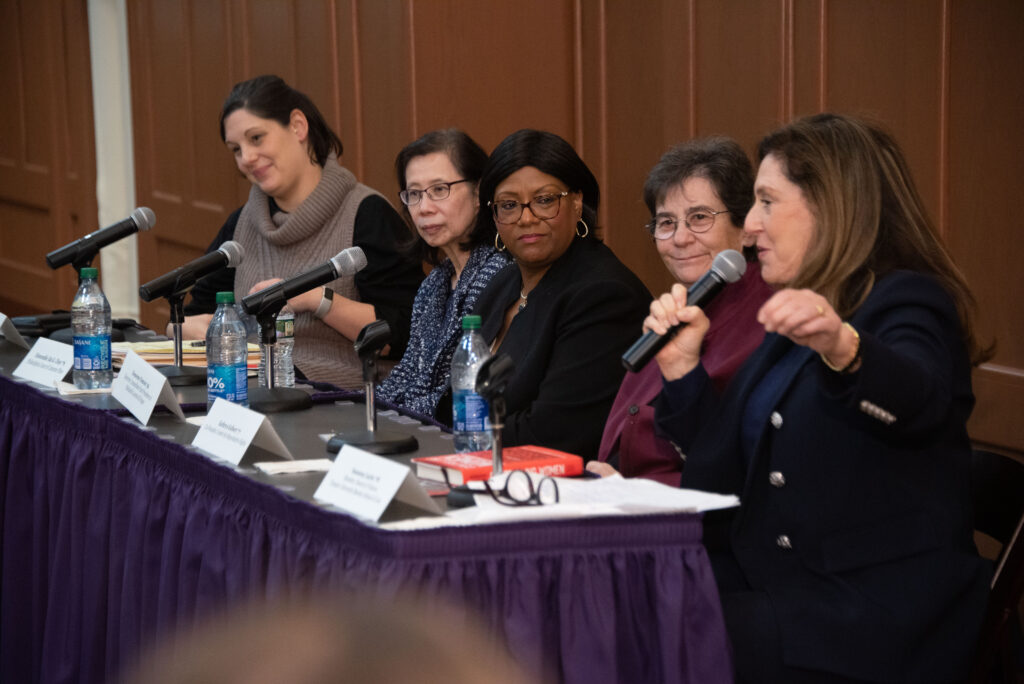This fall, Temple Law School welcomed five accomplished and inspiring alumnae back to campus for a discussion, “Leaders in Gender Equality and the Law.” The panelists, Senator Amanda M. Cappelletti ’17, the Honorable Ida K. Chen ’76, Doneene Damon ’92, and Kathryn Kolbert ’77, were joined by Susanna Lachs ‘78, who served not only as the moderator, but as an event co-organizer.
The event was held in honor of Doreen Davis ‘78, one of Philadelphia’s best-known labor lawyers and, notably, the first working mother to serve as Chancellor of the Philadelphia Bar Association. Davis’s impact on both the legal community and law school was seismic. Lachs, who was her classmate, colleague, and friend, felt called to celebrate her memory in a way she knew Davis would find meaningful – through a gathering of students and graduates to discuss professional impact, gender equity, and navigating a post-Dobbs world.
“We’ve gathered five incredible alumnae, each of whom has used her Temple Law degree in different ways to advance the work of gender equality within both the profession and the larger community,” said Dean Rachel Rebouché. “Our panelists and moderator represent the very best of Temple Law, drawing on a legacy of leadership to shape our future. Together, I hope we’ll learn from their experiences and insights and think in new ways about our own current and future contributions.”
Pennsylvania State Senator Amanda Cappelletti, who represents the 17th Senatorial District in Montgomery and Delaware Counties, is a vocal advocate for gender equality. Prior to her election, Cappelletti served as Director of Policy for Planned Parenthood advocating for reproductive health.
The Honorable Ida K. Chen, a judge on the Philadelphia Court of Common Pleas, was the first Asian American female judge to serve in Pennsylvania and the first Asian American to serve on the Philadelphia Human Relations Commission. She previously served as a trial attorney with the U.S. Equal Employment Opportunity Commission, and as a member of the Pennsylvania Interbranch Commission for Gender, Racial & Ethnic Fairness, promoting the equal application of the law for all individuals throughout the Commonwealth of Pennsylvania.
Doneene Damon, Director and Immediate Past President at Richards Layton & Finger, has had a long and distinguished career in the private sector. In 2021 alone, Damon was named among the Philadelphia Business Journal’s Diversity Leaders in Business, the News Journal’s Most Influential Delawareans, Savoy Magazine’s Most Influential Black Lawyers, and as a Women, Influence & Power in Law Managing Partner of the Year. She is a passionate advocate for diversity and inclusion and has mentored countless young lawyers throughout her career.
Kathryn Kolbert, a public-interest attorney, journalist, and entrepreneurial leader, has been recognized by The National Law Journal as one of the “100 Most Influential Lawyers in America.” In 1992, Kolbert made her second appearance before the U.S. Supreme Court, arguing Planned Parenthood v. Casey. This landmark case was widely credited with saving Roe v. Wade with what has been called “one of the most audacious litigation strategies in Supreme Court history.” As a co-founder of the Center for Reproductive Rights, Kolbert’s legal expertise and tireless advocacy have made her a leader in the field of women’s rights and a powerful voice for change.
Susanna Lachs, the Immediate Past Chair of the Jewish Federation of Greater Philadelphia and a member of the law school’s Board of Visitors, is a former litigation partner at Cohen Shapiro, Polisher Shiekman and Cohen and of Counsel at Kaufman, Coren & Ress PC.
Despite their varied backgrounds, life experiences, and areas of expertise, the panelists share a vision for the future – one of equity and possibility. They emphasized the need for individuals to, in Damon’s words, “challenge the status quo.” Noting ongoing shifts in our cultural and legal understanding of gender, the panel encouraged audience members to include transgender and non-binary people in their support and advocacy as well as cisgender women. As Temple lawyers, and as women, the panel challenged law students and young lawyers to continue the conversation and the pursuit of progress.

